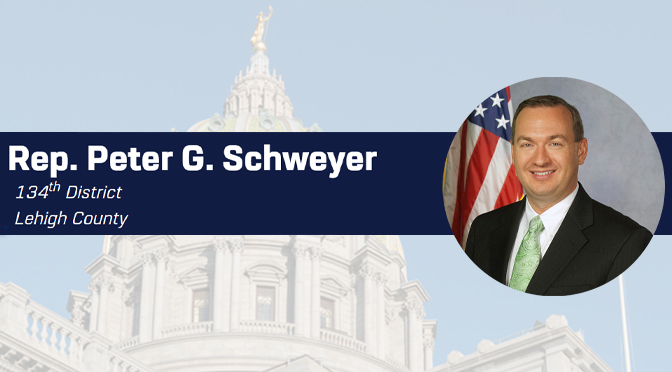OP-ED from state Rep. Peter Schweyer, Chairman of the PA House Education Committee.
Recently, I had a great experience touring a high-achieving public high school in my district.
The school of course had math and English, but also architecture classes. It had wide, clean hallways, high-tech classrooms and even an emotional support dog.
It is the kind of school where families hope to send their kids.
Compare that to a neighboring high school where I have also spent quite a bit of time.
This second building is old and hasn’t been updated in decades. The students have far fewer educational options and are burdened with spotty, inconsistent technology.
Instead of a golden retriever, overworked teachers bear the brunt of serving as the emotional support for many of its students.
These school districts literally border one another. If you live west of Southwest 31st Street, your kids will attend the high-performing high school.
If you live east of Southwest 31st Street, your kids will attend the latter, tired high school. (For the record, my family lives east of Southwest 31st Street.)
As state representative, I see these stark differences and raise questions about education policy, distribution of resources and systemic racism.
As a parent, I am simply infuriated.
This anger is not and most certainly is not a desire to see neighboring kids have less. The children of more fortunate districts absolutely deserve to have quality school buildings and exceptional educational opportunities.
Parents like me simply believe that our kids deserve the same.
The courts agree – we’ve been doing it wrong.
In a historic ruling, Commonwealth Court President Judge Renee Cohn Jubelirer ruled the way we fund our schools is unconstitutional and students attending low-wealth districts are being deprived of equal protection under the law.
Some in the legislature are making veiled threats that if we follow the Constitution, programs in suburban schools will be gutted and those funds will be sent to rural and city schools.
That’s cynical and deliberate fearmongering, and not what we’re talking about. You don’t lift some students up by tearing others down.
For now, the ruling leaves the way we ultimately fix this broken system in the hands of Governor Shapiro and the General Assembly.
As the new Majority Chair of the House Education Committee, it is my job to help craft policies that address these concerns.
There are huge, systemic changes that must be made, and very hard choices will need to be debated. It will not be easy and will not be accomplished quickly.
It is true that the educational landscape is dramatically different today than it was even just a decade ago:
- Colleges are producing fewer teachers every year.
- More children have mental health concerns, live in poverty or do not speak English as a primary language.
- Funding for buildings has dried up, forcing kids to learn in schools with asbestos and lead paint.
- Enrollment in charter schools (both traditional and cyber) has dramatically increased.
- Safety concerns (including mass shootings) leave families and staff worried about safety.
These are big issues that will take courage and time to address.
While we are debating these big issues, new students will enter kindergarten.
These children cannot wait for us to complete an arduous deliberation while they learn in substandard conditions.
Simply stated, Harrisburg will learn to walk and chew gum at the same time.
While we work toward long-term fixes, we must infuse support into the most at-risk districts to close the gap. This is absolutely a priority for the House Democratic Caucus during this budget season.
Though the challenge is great, we have never had a better opportunity to deliver for the children of our state, regardless of which side of Southwest 31st Street they reside.
Information provided to TVL by:
Thomas LeClair
House Democratic Communications Office





